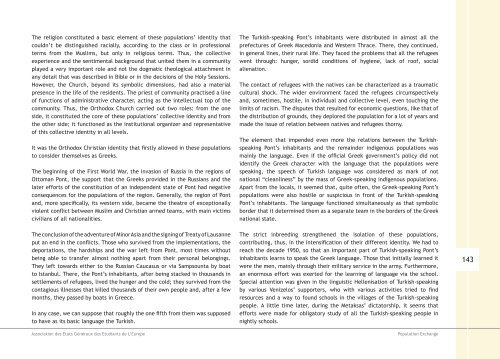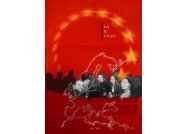turkish-greek civic dialogue - AEGEE Europe
turkish-greek civic dialogue - AEGEE Europe
turkish-greek civic dialogue - AEGEE Europe
You also want an ePaper? Increase the reach of your titles
YUMPU automatically turns print PDFs into web optimized ePapers that Google loves.
The religion constituted a basic element of these populations’ identity that<br />
couldn’t be distinguished racially, according to the class or in professional<br />
terms from the Muslims, but only in religious terms. Thus, the collective<br />
experience and the sentimental background that united them in a community<br />
played a very important role and not the dogmatic theological attachment in<br />
any detail that was described in Bible or in the decisions of the Holy Sessions.<br />
However, the Church, beyond its symbolic dimensions, had also a material<br />
presence in the life of the residents. The priest of community practised a line<br />
of functions of administrative character, acting as the intellectual top of the<br />
community. Thus, the Orthodox Church carried out two roles: from the one<br />
side, it constituted the core of these populations’ collective identity and from<br />
the other side; it functioned as the institutional organizer and representative<br />
of this collective identity in all levels.<br />
It was the Orthodox Christian identity that firstly allowed in these populations<br />
to consider themselves as Greeks.<br />
The beginning of the First World War, the invasion of Russia in the regions of<br />
Ottoman Pont, the support that the Greeks provided in the Russians and the<br />
later efforts of the constitution of an independent state of Pont had negative<br />
consequences for the populations of the region. Generally, the region of Pont<br />
and, more specifically, its western side, became the theatre of exceptionally<br />
violent conflict between Muslim and Christian armed teams, with main victims<br />
civilians of all nationalities.<br />
The conclusion of the adventure of Minor Asia and the signing of Treaty of Lausanne<br />
put an end in the conflicts. Those who survived from the implementations, the<br />
deportations, the hardships and the war left from Pont, most times without<br />
being able to transfer almost nothing apart from their personal belongings.<br />
They left towards either to the Russian Caucasus or via Sampsounta by boat<br />
to Istanbul. There, the Pont’s inhabitants, after being stacked in thousands in<br />
settlements of refugees, lived the hunger and the cold; they survived from the<br />
contagious illnesses that killed thousands of their own people and, after a few<br />
months, they passed by boats in Greece.<br />
In any case, we can suppose that roughly the one fifth from them was supposed<br />
to have as its basic language the Turkish.<br />
Association des Etats Généraux des Etudiants de L’<strong>Europe</strong><br />
The Turkish-speaking Pont’s inhabitants were distributed in almost all the<br />
prefectures of Greek Macedonia and Western Thrace. There, they continued,<br />
in general lines, their rural life. They faced the problems that all the refugees<br />
went through: hunger, sordid conditions of hygiene, lack of roof, social<br />
alienation.<br />
The contact of refugees with the natives can be characterized as a traumatic<br />
cultural shock. The wider environment faced the refugees circumspectively<br />
and, sometimes, hostile, in individual and collective level, even touching the<br />
limits of racism. The disputes that resulted for economic questions, like that of<br />
the distribution of grounds, they deplored the population for a lot of years and<br />
made the issue of relation between natives and refugees thorny.<br />
The element that impended even more the relations between the Turkish-<br />
speaking Pont’s inhabitants and the remainder indigenous populations was<br />
mainly the language. Even if the official Greek government’s policy did not<br />
identify the Greek character with the language that the populations were<br />
speaking, the speech of Turkish language was considered as mark of not<br />
national “cleanliness” by the mass of Greek-speaking indigenous populations.<br />
Apart from the locals, it seemed that, quite often, the Greek-speaking Pont’s<br />
populations were also hostile or suspicious in front of the Turkish-speaking<br />
Pont’s inhabitants. The language functioned simultaneously as that symbolic<br />
border that it determined them as a separate team in the borders of the Greek<br />
national state.<br />
The strict inbreeding strengthened the isolation of these populations,<br />
contributing, thus, in the intensification of their different identity. We had to<br />
reach the decade 1950, so that an important part of Turkish-speaking Pont’s<br />
inhabitants learns to speak the Greek language. Those that initially learned it<br />
were the men, mainly through their military service in the army. Furthermore,<br />
an enormous effort was exerted for the learning of language via the school.<br />
Special attention was given in the linguistic Hellenisation of Turkish-speaking<br />
by various Venizelos’ supporters, who with various activities tried to find<br />
resources and a way to found schools in the villages of the Turkish-speaking<br />
people. A little time later, during the Metaksas’ dictatorship, it seems that<br />
efforts were made for obligatory study of all the Turkish-speaking people in<br />
nightly schools.<br />
Population Exchange<br />
143







